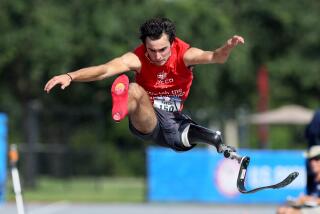U.S. Runs Hot, Cold
Although Kelli White’s drug case remained unresolved, the track and field world championships ended Sunday with U.S. officials feeling a renewed sense of optimism about its medal chances for next summer’s Olympics in Athens.
They were still reeling, however, from a series of embarrassing episodes during the nine days of the championships.
“It was a Dickensian experience,” said Craig Masback, chief executive officer of USA Track & Field. “It was a best of times and worst of times meet. Paris is a great place for that.”
Despite predictions that U.S. athletes would win fewer medals here than in any of the previous eight world championships since the first one in 1983, they performed even better than usual.
Three gold medals on the final day at Stade de France increased the United States’ total to 20 medals, 10 gold.
Establishing that two superpowers still exist in track and field, Russia finished second in the medal count with 19 medals, six gold. No other country won more than seven medals or three gold medals.
White, 26, of Union City, Calif., finished as the meet’s only individual double gold-medalist with her victories in the 100 and 200 meters.
Morocco’s Hicham El Guerrouj, the 1,500-meter champion for the fourth time, and Ethiopia’s Kenenisa Bekele, the 10,000 champion, each had a chance to join White Sunday. But, in perhaps the most thrilling race of the meet, Kenya’s Eliud Kipchoge outran both down the stretch in the 5,000.
White could lose both of her medals depending on the outcome of the International Assn. of Athletics Federation’s investigation into her positive drug test for a stimulant after she won the 100 meters Aug. 24. Additional sanctions could range from a one-time warning to a two-year suspension. Sunday, IAAF officials disclosed White tested negative after the 200 meters on Aug. 28. Masback said the IAAF has set no timetable for when it might conclude its investigation.
“I don’t know if it’s a one-day or a one-week process,” he said.
White tested positive for modafinal, which is not on the banned substance list. The IAAF, however, might rule that it is related to stimulants on the list.
White said Saturday that she takes the drug for narcolepsy. Symptoms include fatigue and sudden sleepiness. The Bay Area physician who prescribed it for her, Dr. Brian Goldman, told the San Jose Mercury News that White’s mother and aunt also suffer from the disease.
“In Kelli’s case, she can get jet lag for up to 12 days,” he told the newspaper. “You can be having a conversation with her, and she just falls asleep.”
He also told the newspaper that he doesn’t believe the drug should be considered performance-enhancing for sprinters.
Even with White’s status in question, Masback said the world championships “really set us up for next year. Ultimately, in our country, it’s the Olympics that are the big thing.”
The United States didn’t have the success it has come to expect in the men’s 100. Veterans such as Maurice Greene, 29, the three-time world champion, and Tim Montgomery, 28, the world-record holder, failed to win medals.
But John Capel, 24, and Darvis Patton, 23, finished 1-2 in the 200. They also were part of the 400-meter relay team Sunday that, even without Greene, Montgomery and Jon Drummond, won a gold medal. J.J. Johnson, 27, running the anchor leg, came from third place to outlean Britain’s Dwain Chambers at the finish line. The Americans finished in 38.06 seconds, the British in 38.08.
Young Americans also emerged in the women’s sprints ready to challenge Marion Jones upon her return from maternity leave next year.
Besides White, 26, Torri Edwards, 26, finished second in the 100 and third in the 200 and was part of the second-place 400 relay team.
Sanya Richards, 18, ran the anchor leg Sunday for the U.S. women’s 1,600-meter relay team that ran 3:22.63 to upset Russia, which finished in 3:22.91.
U.S. men also won their 1,600-meter relay, with quarter-mile champion Jerome Young running the anchor leg. It was the first time he had appeared on the track since The Times revealed last week that he had tested positive for a steroid in 1999 but had been allowed to run in Olympics the next summer after winning an appeal to USATF.
Although USATF and the IAAF have closed the case, the World Anti-Doping Agency and the International Olympic Committee have asked for a review.
Young acknowledged in an interview Thursday that he was the athlete in question, but on Friday he drew a distinction, explaining that he had never “committed a doping offense.”
“I’ve put it behind me,” he said Sunday after outrunning France’s Marc Raquil to the finish line. The U.S. time was 2:58.88. France’s was 2:58.96.
Young’s situation is merely one that occupied USATF’s attention during the meet.
* Drummond withdrew 24 hours before the IAAF suspended him for his protest on the track after his false start in the second round of the 100.
* USATF withdrew the credential of one of its officials for encouraging Drummond’s protest.
* Montgomery left Paris before the relay without informing coaches, although he says now he never committed to run after the 100 final.
And then there was White’s positive test.
Masback said USATF will organize a summit among athletes, coaches and managers to discuss what went wrong here and what can be done to correct it.
Perhaps they will be able to answer his poignant question Sunday.
“Why do these things always happen to us?”
More to Read
Go beyond the scoreboard
Get the latest on L.A.'s teams in the daily Sports Report newsletter.
You may occasionally receive promotional content from the Los Angeles Times.





